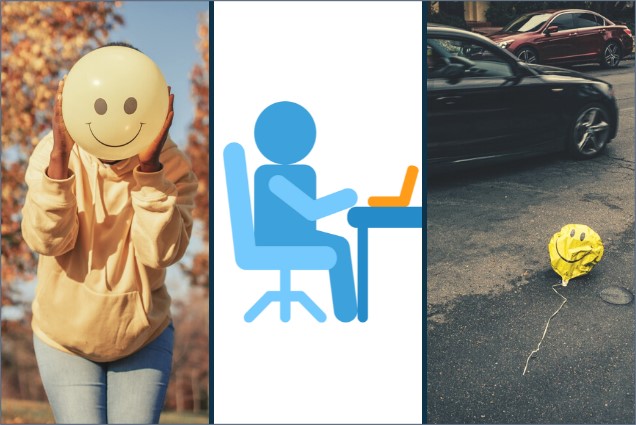How does remote work affect our emotional well-being and mental health? You might get very different answers, depending on whom you ask. Working remotely does wonders for the mood of some employees. Others consider it one more stressor in their life.
To describe its potential impact on mental health, we’ve come up with two scenarios. The stories describe the same day in the life of two remote employees who work for the same company. The first is thriving, but her colleague experiences firsthand why remote work is bad for her mental health.
The Mental Health Benefits: A Relaxed Morning Routine …
When her alarm rings at 07:30, Sophia wakes up well rested. She no longer has to take the train from the suburbs to the downtown office. Instead, she sleeps a little longer before sitting down to breakfast together with her husband. Lucas is not able to work from home. Sophia is secretly glad that she doesn’t have to join him and other yawning commuters on a drafty railway platform. When he leaves, she uses some of the time saved on commuting for a yoga workout.
Afterwards, she puts on sweatpants, a hoodie, and fluffy socks to keep her warm on this chilly October day. Sophia prefers leisurewear to the smart outfits she used to wear at the office. She feels so much more relaxed and comfortable in casual clothes. Her new desk in their spare bedroom is also a much more relaxing environment than the open-plan office she shared with her colleagues. Sophia appreciates the peace and quiet in a work environment free of distractions.
Having her own office also provides a great opportunity to put on a playlist to kick off her working day. While listening to her favorite feel-good songs, Sophia goes through her emails and writes today’s to-do list. Sticking to her morning routine and planning her schedule in bite-sized chunks helps her focus and prioritize. Even the fact that an important meeting has just been moved from 11:00 to 09:15 can’t faze her.
… More Flexibility, Higher Motivation, Increased Productivity
After an undisturbed and very productive morning at work, Sophia has definitely earned her lunch break. She carves out an hour for her latest hobby, urban gardening on the balcony. Having been sitting at her desk for hours, she loves getting to move around in the fresh air.
In winter, when she no longer has any plants to tend to, Sophia will be taking extended lunch breaks. Thanks to remote work, her schedule is much more flexible. She’ll be able to go for long walks in a nearby park, soaking up the sunlight, and catch up on work when it’s getting dark. Today, she just uses her new-found flexibility for a brief mid-afternoon break. Doing a load of laundry, she can cross another chore off her personal to-do list for the weekend.
At 17:00, her team lead has scheduled a virtual coffee chat, just like every Thursday. Sophia is happy to have some time for small talk and socializing with her colleagues. Even better: Her boss starts the meeting by congratulating Sophia on the progress she’s recently made on their project. But mostly, they don’t talk about work, sharing personal photos as an icebreaker instead. Sophia gets a lot of compliments on her balcony garden, and her colleague Yuri posts a hilarious video of his labradoodle in the team chat.
Quality dog content, on top of the positive feedback, is just the kind of motivation that Sophia needs. Maybe she and Lucas could get a puppy, too, she thinks, before tackling the last few tasks of the day.
… More Time for Hobbies and a Great Work-Life Balance
Sophia signs off work at 18:30. In the past, she would never get home before 19:00 or 19:15 — provided the train was actually on time! She uses the extra 45 minutes to decompress with another workout and set the table for a candlelight dinner with Lucas.
Sipping on his glass of wine, her husband sighs. He’s a bit jealous of Sophia’s great work-life balance, he admits. “You’re far less stressed and seem so much happier these days,” Lucas says. “You and your team should really consider yourselves lucky to be working from home!”
Should they? Let’s take a look at Sophia’s colleague Tina to see how things have been working out for her …
The Adverse Effects: Making Mental Health Issues Worse …
Tina isn’t quite sure why, but she has been feeling strangely tired and listless for the past few weeks. Today is not the first time that she has woken up in the middle of the night. After tossing and turning for hours, she’s able to go back to sleep at last.
When her phone alarm rings at 07:30, her night comes to an abrupt end. Bleary-eyed and suffering from a pounding headache, Tina hits the snooze button. Again and again and again. After all, her “commute” is just the ten seconds it takes to get from her bed to her dining table in her 30 m² studio. About to press snooze for yet another time, Tina hears her phone go “ping”. She has just received an urgent email from her team lead. An important meeting has been moved forward from 11:00 to 09:15 — in 25 minutes!
Tina bolts out of bed, hastily brushes her teeth, and throws on yesterday’s dirty sweater. A bit gross, but there’s no time for a shower, let alone going to the bakery. Instead, she makes a cup of instant coffee in her tiny kitchenette to wash down a couple of painkillers. Hopefully, the pills and the caffeine will cure her headache and help with the odd “brain fog” too. Tina has never been much of a morning person. Lately, however, she’s been finding it even harder to be alert and active before noon.
… due to a Lack of Structure and Spontaneous Support …
During the meeting, she has some difficulty focusing on the animated discussion. Asking an obvious question about a point her colleague Sophia explained at length five minutes ago, Tina feels deeply embarrassed. After such a disastrous start to the day, her motivation hits rock bottom. Feeling slightly overwhelmed by her workload, she second-guesses and double-checks most of her output.
At the office, Tina would’ve asked her team members for some spontaneous feedback and a bit of moral support. However, all of them seem to be unavailable. One colleague is in a call, another one has turned off his messenger notifications, and the third is running errands. So, she just muddles through somehow until lunch.
… an Inadequate Work Environment …
Rummaging through her kitchenette, Tina realizes she has no clean dishes left. Since there’s no room for a dishwasher, her sink is filled to the brim with dirty coffee mugs, cereal bowls, and pasta plates. After ordering a pizza, she decides to clean up the worst of the mess during her break.
Her work area could do with a decluttering, too. Her laptop, her stationery, her personal mail, and some long-abandoned knitting projects keep piling up on her apartment’s sole table. While scrubbing dishes and winding yarn, Tina thinks longingly of her old office. She used to have a spacious desk; there was a dishwasher in the office kitchen, and she misses leaving the clutter of her private life behind when she went into work.
Having a neat desk and a tidy kitchen cheers Tina up a little. She’s also relieved that her headache is finally gone. However, the day still seems to be a bit of a slog, and she doesn’t make as much progress as she’d like. To make matters worse, the students from next door start blasting party music again — in the middle of the afternoon! Tina really doesn’t feel up to having another argument with them. She simply keeps pounding on the wall until they turn it down.
… Too Much Screen Time, a Feeling of Isolation …
Even the virtual coffee chat with her team can’t motivate Tina anymore. Feeling the effects of “Zoom fatigue”, she is sick and tired of video conferences. When Sophia gets singled out by their boss for her great work, Tina feels even worse about her earlier blunder and her own lack of progress. And when her colleagues start sharing personal pictures, she thinks about her messy apartment and doesn’t contribute. She doesn’t even comment on Yuri’s cute dog video.
Sometimes, Tina wishes she could get a puppy, too, since she often feels terribly lonely during the day. Unfortunately, her landlord doesn’t allow her to keep any pets in her small studio. Yuri’s puppy has made her smile, though, even if she’s still feeling guilty for not being productive enough.
… and Blurred Lines between Work and Private Life
Tina wants to make doubly sure that she’ll finish the next project milestone on time. When she finally winds up her work, it’s nearly 20:00. The shops are about to close, and it’s dark outside. Therefore, she cancels her evening walk and decides to stock up on fresh groceries another time.
To end the day on a more positive note, Tina calls Vanessa, an old friend from university, for a chat. However, Vanessa cuts her short after a few minutes. Unlike Tina, she is married and a busy mom of two — a toddler and a four-year-old. “I have an important presentation tomorrow morning,” says Vanessa. “I need to put it a couple more hours tonight after the kids are in bed.”
Vanessa struggles with another common side effect of working from home. With 24/7 access to her work computer, she finds it hard to draw the line between her job and private life. She didn’t have this problem before her company went fully remote.
And while Tina sometimes spends an entire day without having an in-person conversation with anyone, between her work and family commitments, her friend would sometimes love to have a moment to herself. There’s one thing they both agree on, though: “Working from home is a terrible idea!”
The Hybrid Work Experience: A Fine Balance
So, who is right? Happy Sophia and her envious husband Lucas? Or poor Tina and her harried friend Vanessa, who never gets a break? Fortunately for the latter, these examples are purely fictional, though the underlying issues are not.
If you’re also jealous of Sophia’s work-life balance, you should talk to your employer. Perhaps you can work remotely more often. Spending a couple of days a week at home might significantly reduce the stress in your life.
If you rather agree with Tina and Vanessa, you might also profit from a hybrid work experience. Working partly from home, partly from the office — or a co-working space — would provide you with (adult) company, a sense of structure, and clear boundaries between work and your private life.
Fortunately, InterNations is now a remote-first company — not a remote-only one. Our team members can choose where to work, depending on their preferences. Working from home does have certain advantages. But I, for one, am planning to return to the office more often, now that we’ve officially introduced hot desking. I’m already looking forward to the upcoming lunch dates with my colleagues. And none of us even needs to do the dishes afterwards!
Image credit: InterNations / iStockphoto / Pexels / Unsplash





